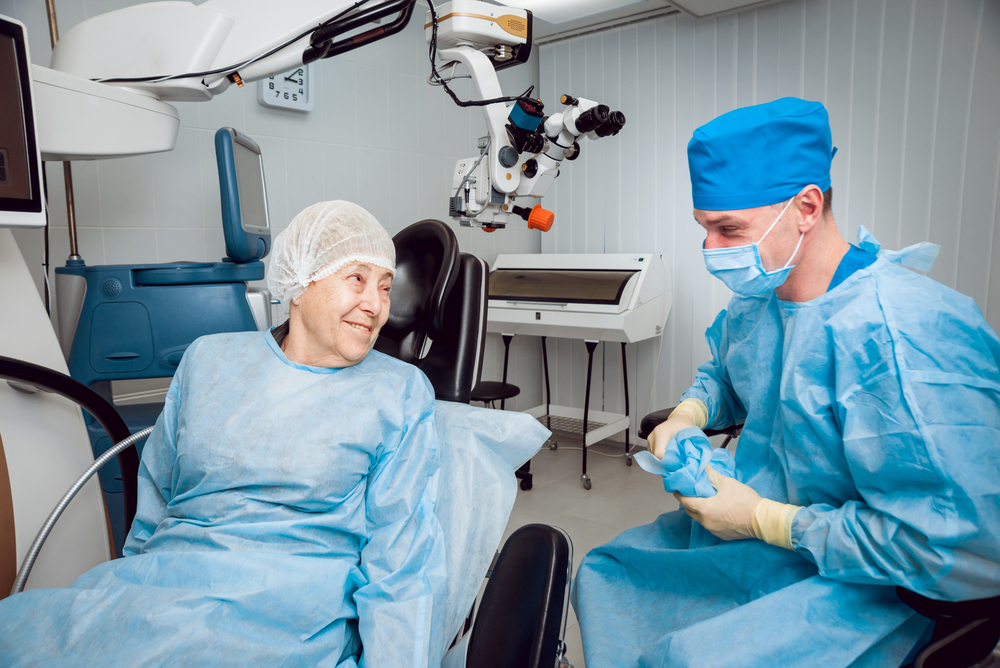
Cataracts are a clouding of the natural lens in the eye that leads to blurred vision, difficulty seeing at night, and other vision problems that get in the way of normal activities. As cataracts worsen, they can significantly impact quality of life for those affected.
If cataracts are impairing your vision, cataract surgery may be recommended to remove the clouded lens and replace it with a clear artificial lens to restore vision. At VisionFirst Eye Center, our experienced surgeons use state-of-the-art technology so you can see clearly again.
Keep reading to learn what happens during cataract surgery!
What is Cataract Surgery?
Cataract surgery is a common outpatient procedure to remove the natural lens in your eye that has become clouded from cataracts and replace it with a clear artificial lens to restore vision. It usually takes less than fifteen minutes and is typically done one eye at a time.
Within a couple days, you should notice improved vision. Cataract surgery is a very safe procedure that can restore your vision and improve your quality of life.
How is Cataract Surgery Performed?
Cataract surgery is typically performed as an outpatient procedure, one eye at a time. First, your eye will be numbed with drops so you don’t feel anything during the procedure.
Next, your cataract surgeon will make a tiny incision in the cornea to access the lens. The cloudy natural lens will be broken up with ultrasound and suctioned out.
Then, your cataract surgeon will insert an artificial intraocular lens, often called an IOL, made of plastic, silicone, or acrylic material in place of your natural lens. These lenses allow you to see clearly.
Your eye doctor will help you determine which IOL is best for you depending on your vision goals, budget and lifestyle. After the IOL is positioned properly, the procedure is complete.
The incision is so small that it usually does not require stitches.
What Happens After Cataract Surgery?
After cataract surgery, you will rest in a recovery area for a little while before being discharged. You will need someone to drive you home since your vision will likely be blurry.
Your eye doctor will give you instructions on how to promote healing and prevent complications. It’s important to follow these directions closely.
You will need to return to visit your eye doctor for a few follow-up appointments so they can monitor your recovery. Your eye doctor will check that your eye is healing properly and, depending on whether or not you need one, give you a new glass prescription once you’ve healed from the procedure.
Strenuous activity and heavy lifting should be avoided for at least a week. Most people can return to normal activity within a week, but complete recovery can take about four to six weeks.
When Will My Vision Be Back to Normal?
Most people notice improved vision quite quickly after cataract surgery, though it may take up to two months for your vision to fully stabilize. Depending on which IOL you choose, glasses or contacts may still be needed for certain activities, especially reading or computer work.
Night vision and color perception also continue improving over several weeks. Your doctor will evaluate your vision recovery at follow-up visits and provide a new glasses prescription if needed.
When is the Right Time for Cataract Surgery?
There is no single right time for everyone. Cataract surgery should be considered when cataracts limit your daily activities like driving, reading, and watching TV or if they seriously impact your work.
Discuss with your ophthalmologist when blurry vision or other symptoms begin substantially interfering with your quality of life. Putting off treatment for too long runs the risk of complications.
Your eye doctor can help determine the optimal timing for surgery based on the status of your cataracts and individual needs.
Are you experiencing symptoms of cataract surgery? Schedule a cataract evaluation at VisionFirst Eye Center in Birmingham, AL, today!








